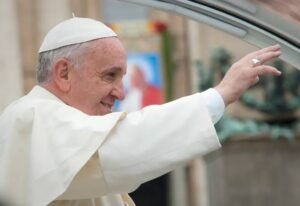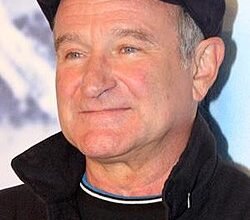Pope Francis Biography: Family, Age, Net Worth, Career, 2025
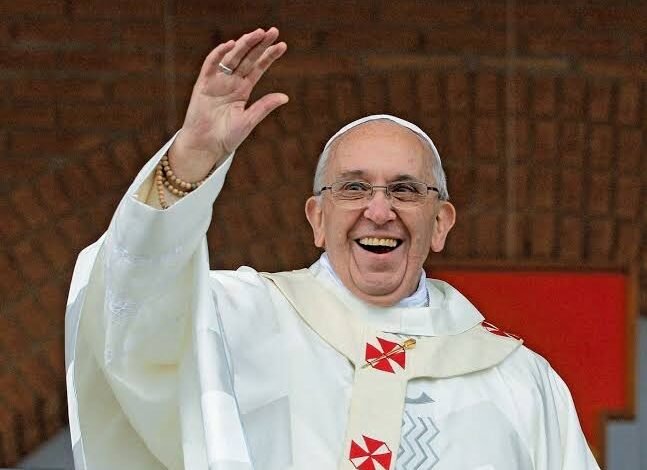
Pope Francis Biography: Pope Francis, the leader of the Roman Catholic Church, has become one of the most influential figures in the world today. Known for his humility, compassion, and progressive views on various social issues, Pope Francis has redefined what it means to be the head of the Catholic Church.
With his gentle and inclusive approach to leadership, he has gained worldwide admiration and respect. His impact, both as a religious leader and as a global advocate for social justice, is profound and far-reaching. But how much do you truly know about Pope Francis? What is his real name? How did he become the Pope, and what is his net worth?
In this biography, we’ll explore Pope Francis’ life in great detail. We’ll talk about his early years, his career, his rise to the papacy, and what makes him one of the most admired figures in the world today. Additionally, we’ll touch on his family, personal life, and his estimated net worth as of 2025. Get ready to dive deep into the inspiring journey of Pope Francis.
Who Is Pope Francis?
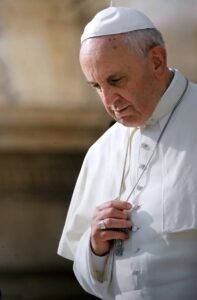
Pope Francis Biography: Pope Francis is the 266th and current Pope of the Roman Catholic Church. His birth name is Jorge Mario Bergoglio, and he was born on December 17, 1936, in Buenos Aires, Argentina.
He became the leader of the global Catholic Church on March 13, 2013, after being elected by the College of Cardinals. He chose the name “Pope Francis” in honor of Saint Francis of Assisi, a man renowned for his humility and dedication to the poor.
Pope Francis is known for being a reformer within the church, focusing on themes such as mercy, forgiveness, and the importance of caring for the marginalized. His papacy is marked by a shift towards humility, simplicity, and compassion for the less fortunate.
While he continues to uphold the traditional teachings of the Catholic Church, Pope Francis has made it clear that he wishes to focus on healing the world’s wounds, particularly poverty, inequality, and environmental damage.
Despite the Vatican’s enormous wealth and influence, Pope Francis is known for leading a simple life. His humility has earned him the respect of many, both within and outside of the church.
Unlike his predecessors, Pope Francis shuns extravagant palaces. He prefers a modest apartment in the Vatican, living a life more in line with his core values of simplicity and service to others.
Born in Buenos Aires, Argentina, to Italian immigrants, Jorge Mario Bergoglio had a rather humble beginning. His father, Mario Bergoglio, worked as a railway worker, and his mother, Regina Sivori, was a homemaker.
He had four siblings and was raised in a close-knit family environment. Growing up in a working-class neighborhood, Pope Francis learned the values of hard work, family, and community from an early age.
Jorge attended school at the Technical School of the Salesian Fathers in Buenos Aires, where he excelled academically. Although he initially planned to follow a career in chemistry, his religious calling grew stronger. At the age of 21, he entered the Society of Jesus, the Jesuit order, and began his path toward the priesthood.
During his years as a Jesuit novice, Bergoglio experienced a transformative period in his life. He spent a considerable amount of time in spiritual reflection and was deeply influenced by the teachings of Saint Ignatius of Loyola, the founder of the Jesuit order. After completing his training, he was ordained as a priest in 1969.
Pope Francis Biography: Education and Early Career
After his ordination, Father Jorge Mario Bergoglio pursued higher education in theology and philosophy. He earned a degree in philosophy from the University of Buenos Aires, where he later taught.
His academic background helped him become a great spiritual leader, able to connect with people through deep theological insights while staying grounded in practical, everyday concerns.
In the years following his ordination, Bergoglio held several positions within the Jesuit order, including spiritual director and rector of a high school. His work within the church was often centered on his desire to serve the poor and the marginalized, as well as to promote a life of simplicity.
Bergoglio’s time as the Provincial Superior of the Society of Jesus in Argentina (1973–1979) would prove to be significant in shaping his approach to leadership. It was during this time that he dealt with the challenges posed by the military dictatorship in Argentina, which was responsible for numerous human rights violations.
His criticism of the government led to tensions within the church but also earned him respect for standing up for justice.
Archbishop of Buenos Aires and Cardinal
In 1998, Pope John Paul II appointed Bergoglio as the Archbishop of Buenos Aires, Argentina’s largest and most influential archdiocese. As the Archbishop, Bergoglio became known for his focus on social issues, particularly poverty.
His deep concern for the poor was reflected in his actions, and he began working toward alleviating the suffering of the marginalized. His efforts to foster a sense of community and solidarity among the poor made him very popular among ordinary people in Argentina.
In 2001, Pope John Paul II made Bergoglio a Cardinal, elevating him to a position of even greater prominence within the church. His new title allowed him to influence church policy on a global scale, but he never lost sight of his core values. Even as Cardinal, Bergoglio maintained his focus on the poor and disenfranchised, often visiting slums and working directly with marginalized communities.
Election as Pope
In 2013, following the resignation of Pope Benedict XVI, the College of Cardinals gathered to elect a new pope. Cardinal Jorge Mario Bergoglio was selected after just five ballots, making him the first pope from the Americas and the first Jesuit pope in history. He chose the name Pope Francis in honor of Saint Francis of Assisi, who dedicated his life to the poor and the care of the sick.
His election as Pope was a surprise to many, as he was considered a dark horse candidate. However, his commitment to simplicity, humility, and social justice made him the ideal choice for the papacy at a time when the Catholic Church was facing scandals and controversies. Pope Francis quickly gained popularity, not only for his progressive views but also for his approachability and willingness to engage with people from all walks of life.
Key Messages and Teachings of Pope Francis
Pope Francis is known for his focus on mercy, compassion, and social justice. Throughout his papacy, he has emphasized the importance of caring for the poor, protecting the environment, and promoting peace. One of his most important messages has been the need for the Catholic Church to be a church for the poor, focusing on the marginalized rather than the wealthy and powerful.
Some of his most notable teachings include:
- Mercy and Forgiveness: Pope Francis has repeatedly spoken about the need for mercy and forgiveness, both in the church and in society. His message of God’s mercy has resonated with millions of Catholics and non-Catholics alike, encouraging people to extend compassion to others, especially those who have wronged them.
- Care for the Environment: In 2015, Pope Francis issued his landmark encyclical Laudato Si’, which addressed the issue of climate change and the need for the world to take better care of the environment. He called on governments and individuals to work toward a sustainable future and to recognize the environmental challenges that threaten the planet.
- The Refugee Crisis: Pope Francis has been vocal about the global refugee crisis, calling for greater compassion and action to support refugees fleeing war and persecution. He has consistently advocated for open borders and equal treatment of refugees, urging nations to do more to help those in need.
- Social Justice: Pope Francis has often spoken out against economic inequality, global poverty, and the exploitation of workers. He has challenged the world’s wealthiest nations to share their resources more equitably and to create systems that are just and sustainable.
Personal Life and Family
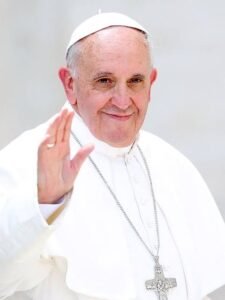
Pope Francis was born into a loving family. He is one of five children, and his parents were immigrants from Italy. Despite his status as Pope, he remains deeply connected to his family and his Argentine roots. His younger brother, Alberto, lives in Argentina, and the Pope often refers to his family members with affection and care.
Pope Francis has never been married and does not have a spouse. As a Catholic priest, he took a vow of celibacy, which means he has committed himself to serving the church and its followers without the distractions of personal relationships. Despite his vow, Pope Francis has shown warmth and care for people, often referring to the worldwide church community as his “family.”
Net Worth of Pope Francis
Although Pope Francis is the head of the Vatican and the Catholic Church, his wealth is rather modest. As of 2025, Pope Francis’ net worth is estimated to be around $20 million. However, this wealth is not his fortune. Most of the Vatican’s assets come from real estate holdings, art collections, and donations. Pope Francis himself lives in a small apartment and leads a simple lifestyle, often using his position to advocate for those living in poverty.
Despite the Vatican’s immense wealth, Pope Francis has made it clear that he believes the church should focus on service rather than wealth accumulation. He regularly donates to charitable causes and uses his position to highlight the struggles of the poor and underprivileged.
Pope Francis in 2025: Influence and Legacy
As of 2025, Pope Francis continues to lead the Catholic Church with a spirit of compassion, humility, and service. His legacy is one of social justice, environmental awareness, and interfaith dialogue. His influence extends far beyond the Catholic community, and he is often regarded as a voice for peace, compassion, and human dignity on the world stage.
Despite facing criticism from conservative factions within the church, Pope Francis remains committed to his mission of reform and social advocacy. His work continues to inspire millions of people around the world, regardless of their religious background.
Conclusion
Pope Francis Biography: Pope Francis’ biography is a testament to a life dedicated to service, simplicity, and social justice. From his humble beginnings in Argentina to his rise as the leader of the Catholic Church, Pope Francis has become a symbol of hope and compassion. His messages of mercy, care for the poor, and environmental responsibility have resonated with millions of people, and his influence will continue to shape the future of the Catholic Church and the world for many years to come.
If you’ve found Pope Francis’ story inspiring and wish to learn more about his teachings, his influence on the world, and his incredible journey, continue to explore his life’s work and the positive impact he has made on global society.
Call to Action:
Share this biography of Pope Francis with friends and family, and encourage others to learn more about the incredible life of this remarkable man. Please stay connected with updates on Pope Francis and his contributions to a better world.
